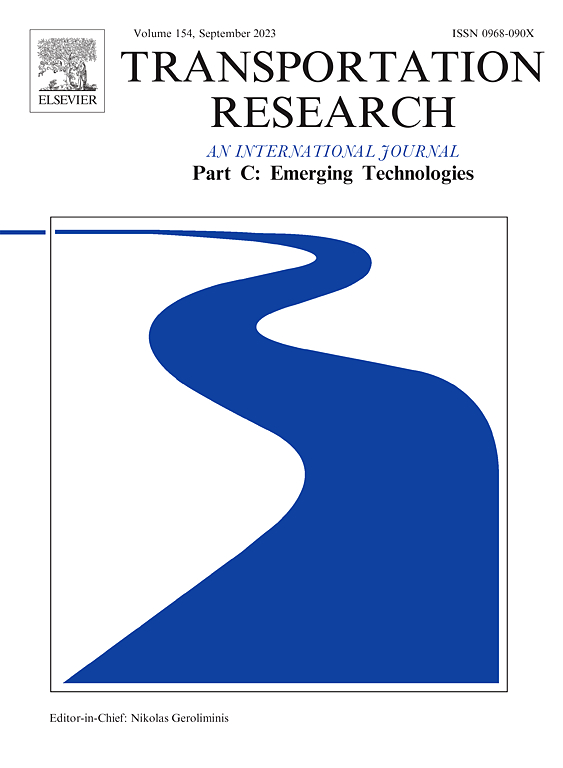City metro network expansion based on multi-objective reinforcement learning
IF 7.6
1区 工程技术
Q1 TRANSPORTATION SCIENCE & TECHNOLOGY
Transportation Research Part C-Emerging Technologies
Pub Date : 2024-10-17
DOI:10.1016/j.trc.2024.104880
引用次数: 0
Abstract
This manuscript focuses on investigating the metro network expansion problem, which is formulated as a Markov Decision Process and addressed using a sequential station selection methodology. To identify an effective expansion strategy, we introduce a multi-objective reinforcement learning framework, which encompasses objectives such as traffic demands, social equity, and network accessibility. The proposed method can explore the entire city area without limiting the search space, by leveraging reward calculations to fine-tune the policy during the learning process To effectively address the challenges posed by multiple objectives and the curse of dimensionality, the proposed method utilizes an actor-critic framework. The actor is responsible for selecting actions, specifically determining the next metro station to be added to the network. The critic evaluates the performance of the given policy, providing feedback on the quality of the expanded metro network. Furthermore, by integrating the Tchebycheff decomposition method into the actor-critic framework, the proposed method enhances the exploration and optimization of the non-convex metro network expansion problem. Our method has been validated through experiments utilizing real-world data and outperforms traditional heuristic algorithms by over 30%. These results compellingly illustrate the superior effectiveness of our proposed method.
基于多目标强化学习的城市地铁网络扩展
本手稿重点研究地铁网络扩建问题,该问题被表述为马尔可夫决策过程,并采用顺序车站选择方法加以解决。为了确定有效的扩建策略,我们引入了多目标强化学习框架,其中包括交通需求、社会公平和网络可达性等目标。为了有效应对多目标和维度诅咒带来的挑战,我们提出的方法采用了行动者批判框架。行动者负责选择行动,特别是决定下一个要添加到网络中的地铁站。批评者则对给定政策的性能进行评估,并就扩建地铁网络的质量提供反馈。此外,通过将切比切夫分解法整合到行动者-批评者框架中,所提出的方法增强了对非凸地铁网络扩展问题的探索和优化。我们的方法已通过利用真实世界数据的实验进行了验证,其性能比传统启发式算法高出 30% 以上。这些结果有力地说明了我们提出的方法的卓越功效。
本文章由计算机程序翻译,如有差异,请以英文原文为准。
求助全文
约1分钟内获得全文
求助全文
来源期刊
CiteScore
15.80
自引率
12.00%
发文量
332
审稿时长
64 days
期刊介绍:
Transportation Research: Part C (TR_C) is dedicated to showcasing high-quality, scholarly research that delves into the development, applications, and implications of transportation systems and emerging technologies. Our focus lies not solely on individual technologies, but rather on their broader implications for the planning, design, operation, control, maintenance, and rehabilitation of transportation systems, services, and components. In essence, the intellectual core of the journal revolves around the transportation aspect rather than the technology itself. We actively encourage the integration of quantitative methods from diverse fields such as operations research, control systems, complex networks, computer science, and artificial intelligence. Join us in exploring the intersection of transportation systems and emerging technologies to drive innovation and progress in the field.

 求助内容:
求助内容: 应助结果提醒方式:
应助结果提醒方式:


